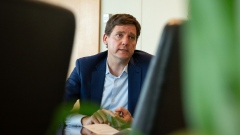Feb 24, 2024
Swiss Balking at Later Retirement Shows Rich Nation Aging Crunch
, Bloomberg News

(Bloomberg) -- One of Switzerland’s youngest lawmakers is pushing to raise the retirement age to address a looming pension-fund deficit, but wary voters seem more inclined toward a parallel proposal to boost state payouts.
Under the country’s system of direct democracy, Andri Silberschmidt of the pro-market Free Democrats has gathered enough support to hold a vote on whether to raise the retirement age by one year to 66 by 2033, and thereafter in line with life expectancy. That would address the challenges posed by an aging population, as the number of Swiss pensioners per 100 working-age citizens is projected to double by the 2080s.
For Silberschmidt — a trained banker who co-founded a poke bowl delivery business — the numbers just don’t add up.
“My political horizon are not four years, but rather 40,” Silberschmidt said in an interview. “We shouldn’t promise pensions which the economy doesn’t earn.”
Many nations, including the US and UK, already have a higher retirement age as they try to plug a deepening pension-fund gap. However, with only 35% support in final polls, Silberschmidt’s initiative looks likely to fail in a plebiscite next Sunday.
Switzerland hasn’t seen the mass pension reform protests that hit France and other countries last year, but there is concern that retirement funds are being eroded by inflation and dwindling investment returns. That’s prompted labor unions to back an initiative for a 13th pension payment that would boost state retirement funds for a single person by about 8% to a maximum of 31,850 Swiss francs ($36,140) a year.
Support for the measure fell to 53% of voters in the survey published Wednesday by broadcaster SRG SSR, suggesting it will be close call. The initiative could also miss a required majority among Switzerland’s cantons.
While almost one in six Swiss are millionaires, the state pension is the main source of income for about 20% of the population, according to social policy think-tank Avenir Suisse.
“The purchasing power of old-age pensions in Switzerland is declining,” the labor unions said in a statement outlining the case for a 13th check. “Higher health insurance premiums, rents and prices have eaten away a monthly pension.”
The annual cost of the unfunded additional pension payment is estimated at 4.1 billion francs. That would put more pressure on a pension system that’s already projected to start running short of funds from 2030.
Raising pensions would also undermine incentives to work longer than the official retirement age, according to Boris Zuercher, labor market chief of SECO, Switzerland’s State Secretariat for Economic Affairs. Many Swiss already retire before 65, including bankers at an average age of 62.8 years.
Curbing Immigration
Any lingering hope for Silberschmidt’s initiative may hinge on the backing of the right-wing Swiss People’s Party. Switzerland’s biggest political party hopes that it will reduce the necessity for immigrant workers to support the nation’s aging population.
“The initiative reduces immigration,” SVP lawmaker Manuel Strupler said in a statement. “The recipe of left-green parties is simple: the funding gap should be filled with higher taxes or simply with even more immigration. But that only shifts the problem and destroys our Switzerland.”
Read More: Switzerland’s Top Party Wants Fewer People — Employers Need More
Switzerland is certainly facing a structural shortage of workers, according to SECO’s Zuercher.
“We already now have a situation in which less 20-year-olds are moving into the job market than 65-year-olds leave it,” he told Bloomberg. “The question whether employees should maybe work longer poses itself.”
Despite the gloomy polls, Silberschmidt, who turns 30 next week, remains optimistic about the initiative’s prospects.
“Asking the people whether they want to work longer is one of the most difficult questions you can ask in a vote,” he says. “In the end, it’s a question of common sense. I believe the people will understand the problem if it’s explained to them.”
Read More: Why Slow-Burn Pension Crisis Is Getting Harder to Fix: QuickTake
©2024 Bloomberg L.P.








